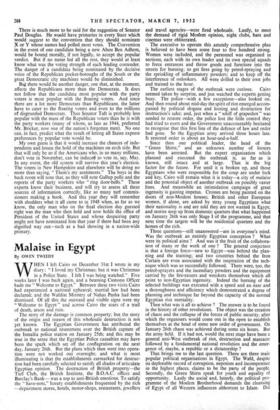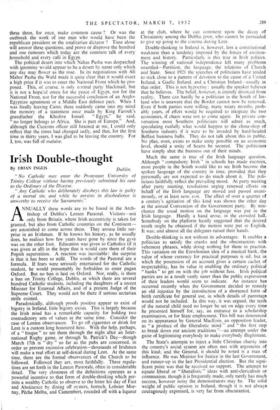Malaise in Egypt
By OWEN TWEEDY
WHEN I left Cairo on December 31st I wrote in my diary : " I loved my Christmas; but it was Christmas ' in a Police State. I felt I was being watched." Five weeks later I was back again, and a beaming Customs Officer bade me " Welcome to Egypt." Between these two visits Cairo had experienced a national upheaval; martial law had been declared; and the Wafdist Ministry of Nahas Pasha had been dismissed. Of all this the outward and visible signs were my " Welcome to Egypt " and across Cairo the scars of a trail of death, arson and ruin.
The story of the damage is common property; but the story of the origin and reason of this wholesale destruction is not yet known. The Egyptian Government has attributed the outbreak to national resentment over the British capture of the Ismailia police station on January 25th; and this may be true in the sense that the Egyptian Police casualties may have been the spark which set off the conflagration on the next day, January 26th. But the plans which then went into opera- tion were not worked out overnight; and what is most illuminating is that the establishments earmarked for destruc- tion had been carefully selected to satisfy all shades of articulate Egyptian opinion. The destruction of British property—the Turf Club, the British Institute, the B.O.A.C. offices and Barclay's Bank— was a sop to anti-British emotions. To satisfy the " have-nots," luxury establishments frequented by the rich —department stores, hotels, motor-shops, restaurants, jewellers and travel agencies—were fired wholesale. Lastly, to meet the demand of rigid Moslem opinion, night clubs, bars and cinemas were obliterated.
The executive to operate this astutely comprehensive plan is believed to have been some four to -five hundred strong. Women were included, and the personnel was organised in sections, each with its own leader and its own special squads to force entrances and throw goods and furniture into the streets for burning; to get fires going by petrol-spraying and the sprinkling of inflammatory powders; and to keep off the interference of onlookers. All were drilled to their own jobs and trained to the hour.
The earliest stages of the outbreak were curious. Cairo seemed taken by surprise, and just watched the experts getting busy. The police—with a few exceptions—also looked on. And then round about mid-day the spirit of riot emerged accom- panied by political slogans and looting and destruction for destruction's sake; and, just when a " whiff of grapeshot " was needed to restore order, the police lost the little control they had tried to exert and the Government unaccountably hesitated to recognise that this first line of the defence of law and order had gone. So the Egyptian army arrived three hours late. It restored order in about an hour-and-a-half.
Since then one political leader, the head of the " Green Shirts," and an unknown number of looters have been arrested. But the expert organisation which planned and executed the outbreak is, as far as is known, still intact and at large. That is the big factor for the future. For until it is broken up, and those Egyptians who were responsible for the coup are under lock and key, Cairo will remain what it is today—a city of malaise and the potential object of another outbreak on possibly vaster lines. And meanwhile an intimidation campaign of great ingenuity is gaining impetus. Crosses are being painted on the doors of non-Moslem houses; British and other European women, if alone, are asked by stray young Egyptians what their nationality is and are told they are not wanted in Egypt; and stories seep up from domestic quarters that what happened on January 26th was only Stage I of the programme, and that next time the targets will be the residential quarters and the homes of the rich.
Three questions—still unanswered—are in everyone's mind. Was the outbreak an entirely Egyptian conception ? What were its political aims ? And was it the fruit of the collabora- tion of many or the work of one ? The general conjecture is that a foreign force—new to Egypt—was behind the plan- ning and the training; and two countries behind the Iron Curtain are even associated with the inspiration of the tech- nique which was so successfully followed. There were, too, the petrol-sprayers and the incendiary powders and the equipment carried by the fire-raisers and wreckers themselves which all point to non-Egyptian ingenuity. Indeed the burning of the selected buildings was executed with a speed and an ease and a thoroughness and efficiency which demonstrated a degree of planning and technique far beyond the capacity of the normal Egyptian riot mentality.
Then what was it all to achieve ? The answer is to be found in the history of other revolutions. The object was the creation of chaos and the collapse of the forces of public security, after which the organisers would come out in the open to establish themselves at the head of some new order of government. On January 26th chaos was achieved during some six hours. But the army held. If it had not, would the next stage have been a general anti-West outbreak of riot, destruction and massacre followed by a fundamental national revolution and the emer- gence of, maybe, a republic or a dictatorship ?
That brings me to the last question. There are three main popular political organisations in Egypt. The Wafd, despite its deplorable record of corruption, nepotism and incompetence in the highest places, claims to be the party of the people. Secondly, the Green Shirts speak for youth and equality of opportunity. Lastly the social and, latterly, the political pro- gramme of the Moslem Brotherhood demands the cleansing of Egypt of all Western influences. abhorrent to Islam. Did these three, for once, make common cause ? Or was the outbreak the work of one man who would have been the republican president or the totalitarian dictator ? Time alone will answer these questions, and prove or disprove the hundred and one rumours which today are the common talk of every household and every cafe in Egypt.
The political desert into which Nahas Pasha was despatched with ignominy would appear to be a desert by name only which any day may flower as the rose. In its negotiations with Ali Maher Pasha the Wafd made it quite clear that it would exact a high price if it was to enter the National Front which he pro- posed. This, of course, is only normal party blackmail; but it is not a hoperul omen for the peace of Egypt, nor for the National Front, nor for the successful conclusion of an Anglo- Egyptian agreement or a Middle East defence pact. When I was finally leaving Cairo, there suddenly came into my mind the memory of a statement once made by King Farouk's grandfather the Khedive Ismail. " Egypt," he said, " no longer belongs to Africa. She is part of Europe." And, although the Customs officer still beamed at me, I could only reflect that the times had changed sadly, and that, for the first time in thirty years, I was glad to be leaving the country. For I, too, was full of malaise.



































 Previous page
Previous page